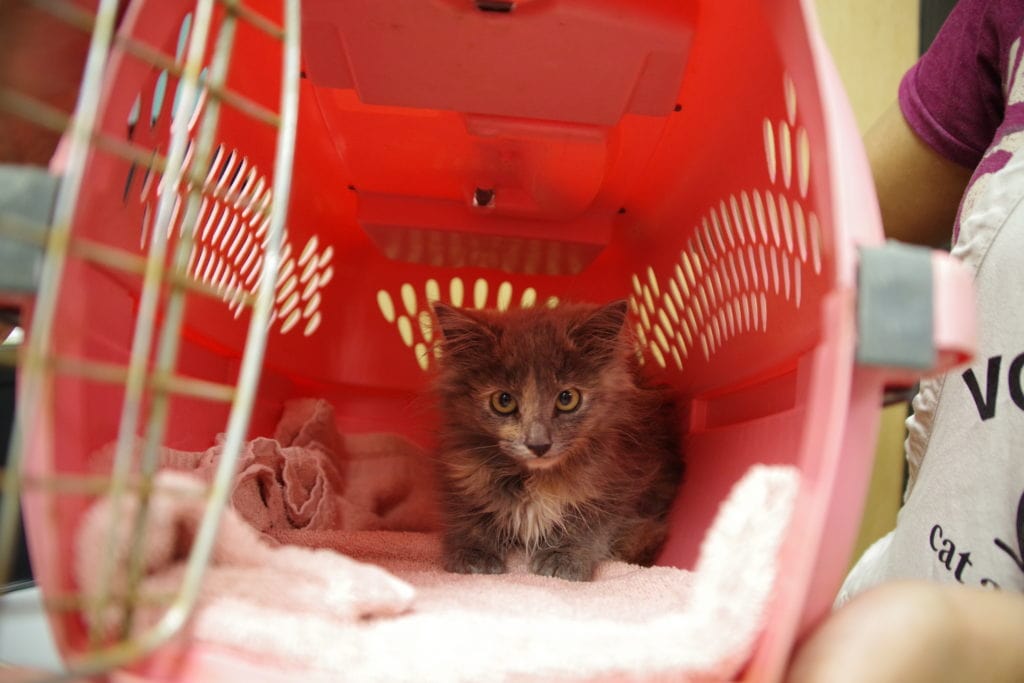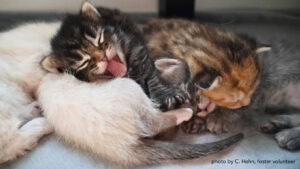Disaster can strike at any time. It’s scary to think about, but a little advanced planning can ease some of the fear and help keep you and your pets safe.
Whether it’s a house fire or a hurricane, you’ll want to be ready. And since cats are ill-equipped to prepare themselves in case of a disaster, it’s up to us — their human friends — to plan ahead. Take time now to create your disaster emergency plan and kit. Then, if something happens, you’ll be prepared to help keep you and your pets safe.
One quick thing Oregonians can do to stay safe is to register to receive important notifications and evacuation information for your specific location. Sign up now at publicalerts.org.
5 things you can do right now to keep cats safe in an emergency:
1. Prepare a Disaster Kit for Your Pet
Pre-pack a plastic bin or backpack with the following items:
- Five- to seven-day supply of food and bottled water per pet, along with bowls and, if needed, a manual can opener
- Litter, litter box, scoop, and garbage bags
- Any medications that your pet needs
- Sturdy carriers/crates and extra collars and leashes
- Copies of your pet’s paperwork: medical history, microchip number and company contact information, your veterinarian’s name and contact details, and information about your pet’s diet and behavior in case you need to use a temporary foster home or a boarding facility (It’s smart to store this information on a USB drive too, just in case paperwork gets destroyed.)
- Pet first aid kit
- Liquid dish soap and disinfectant
- Towels and blankets
- Pet toys
- Flashlight and fresh batteries
- Proof of ownership – a copy of vet records and adoption documentation, licensing records, and photos of you and your pet together.
2. Map Out a Pet-Friendly Safe Haven
You want to be ready to take your pets with you in case of an emergency evacuation. Most animal shelters don’t have the capacity to provide emergency boarding for pets in the event of a natural disaster or evacuation. Seek out pet-friendly hotels or motels, as well as pet-friendly campgrounds, and identify emergency boarding facilities where you and your pet could go during a disaster.
Most Red Cross shelters are unable to welcome pets into their shelters. The Red Cross has partnered with RedRover, which can help you find out where pets can safely stay during an emergency.
Keep a list of these places in your Disaster Kit. That way, you’ll know where you can take your pets if you need to evacuate your home.
3. Assign Emergency Pet Caregivers
You’ll want to have someone nearby who is ready to lend a hand in the case of an emergency where you can’t get home. Reach out to neighbors or nearby family and friends and create a plan so they can care for your cats if you’re away; offer to do the same for their pets if they aren’t home when disaster strikes. Make sure you each have the necessary supplies and a key or other information about how to get into the house if it’s locked.
It’s also important to identify family or friends outside of your immediate area who agree to accommodate you and your pets if you need to evacuate and can’t find other pet-friendly shelter.
4. Keep Pet ID Info Up-To-Date
If you and your cat are separated, having a license and a microchip are the best precautions to help others contact you in an emergency. Make sure tags have current phone numbers.
- Keep your kitty in a well-fitted breakaway collar with current tags.
- License your pet with your local jurisdiction.
- Microchip your cat with your local vet.
- If your pet is microchipped, update your contact information with the microchip registry.
5. Post “Rescue Alert” Stickers
The ASPCA offers free Rescue Alert stickers to post in the windows of your home, preferably close to your front door. If a disaster occurs while you’re away, these stickers alert emergency personnel that there are animals inside your house who need help. If you are evacuated and you take your pets with you, write EVACUATED across the sticker so it’s clear your pets are no longer in the home.
Other Disaster Preparedness Resources:
- Humane Society of the United States
- ASPCA: Disaster Preparedness
- Protect Your Pets from Wildfire Smoke
- Ready America: Pet-related information, video, brochure and toolkit
- Disaster Preparedness for Pets – Medicare Supplement
- List of links and additional resources







